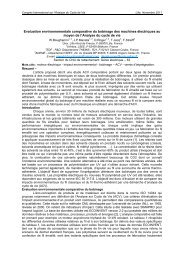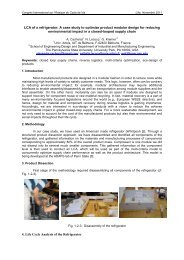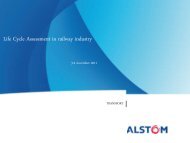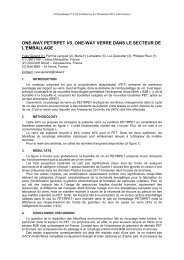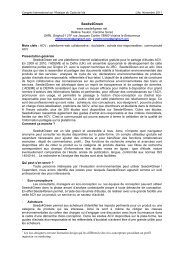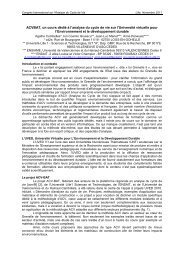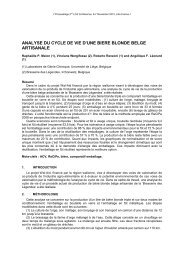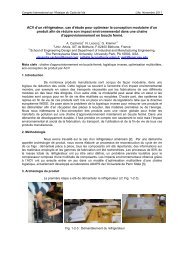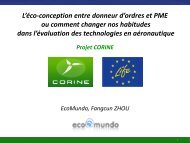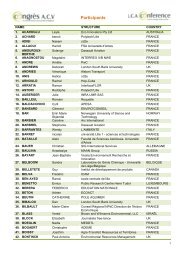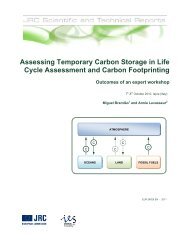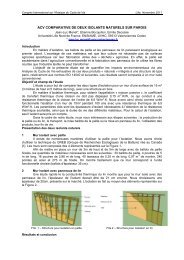Untitled - avniR
Untitled - avniR
Untitled - avniR
You also want an ePaper? Increase the reach of your titles
YUMPU automatically turns print PDFs into web optimized ePapers that Google loves.
Congrès International sur l’Analyse du Cycle de Vie Lille, Novembre 2011<br />
Comparative Life Cycle Assessment of publicity products produced with recycled<br />
plastic<br />
Nicolas BARRET*,**, Maxime BULTEAU**, Ion Cosmin GRUESCU*<br />
*Université Lille 1 - Sciences et Technologies, IUT "A", Dép. GMP,<br />
Rue de la Recherche, BP 90179, 59653, Villeneuve d'Ascq Cedex<br />
**Madeinbio, 102 rue de Lannoy 59650 Villeneuve d'Ascq<br />
nico.barret@gmail.com, max@cotton-blue.com, ion-cosmin.gruescu@univ-lille1.fr<br />
Keywords: Life Cycle Assessment (LCA), Recycled plastics, Environmental Impact<br />
Abstract:<br />
The present study is dedicated to the presentation and to the interpretation of some results<br />
obtained by applying the Life Cycle assessment methodology to a product realized within recycled plastics<br />
(the bottle-opener). The product is fabricated in France and commercialized to be used for communication<br />
proposals. The main objective of the study is to evaluate the environmental consequences of the<br />
production and of the commercialization of this product by accounting its major lifecycle steps. Some<br />
comparison elements with respect to a more classical production and distribution (production in China from<br />
virgin, non-recycled plastics) are equally presented. Both products present identical functionality<br />
characteristics, only the weight of the product realized with normal plastics being of 20% superior to the<br />
one of the recycled plastics obtained product.<br />
Introduction<br />
The problematic of waste management and the utilisation of recycled plastics occupies an<br />
important place in the design of products with a reduced environmental footprint. This major topic<br />
preoccupies the industrial actors in the very restrictive statutory, technological and economical context [1].<br />
- Eco-design and Life Cycle Assessment of the bottle-opener<br />
The main environmental footprint of plastics is the raw material consumption. In order to reduce it<br />
2 options are possible: (i) use less impacting raw materials and (ii) recycling the products. It's the first<br />
solution that was adopted for the realization of the studied products.<br />
The "bottle opener"<br />
The chosen product must respect sustainability principles, respectively:<br />
use only one raw material (polyethylene terephtalate - PET) and reduce its transport.<br />
optimized weight with respect to classical products<br />
fabrication in France, in order to reduce the transport impact<br />
Obtained results<br />
The product was modeled in "close circuit", which means that in the end of life step the plastic is<br />
recycled and re-used to fabricate a similar product. The main life cycle steps considered in this study are<br />
the raw material extraction, the fabrication, the transports and the end-of life. It was shown that the energy<br />
consumption and water eutrophication are the main environmental impacts in the case of the "plasticrecycled”<br />
product (Fig. 1). A comparison with a normal product was also realised.<br />
Conclusion<br />
It was shown in the present study that the use of recycled plastics allows a footprint decrease for<br />
all the analyzed impacts. The local production is also an important factor which contributes to the<br />
diminution of the environmental footprint because of the small transport distances and of the energetically<br />
mixture (nuclear based) in France.<br />
Références<br />
[1] C. A. Nyland, I.S. Modahl, H.L. Raadal, O.J. Hanssen, Application of LCA as a Decision –Making<br />
Tool for Waste Management Systems, Intl. Journal of Life Cycle assessement, 8 (6), 2003, pp 331-<br />
336.<br />
- 70 -



